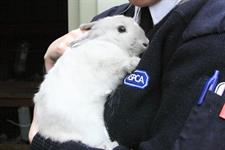PDSA is taking over free veterinary services previously provided by the RSPCA, in a partnership between two of the country’s largest animal welfare charities.
The RSPCA will stop providing subsidised public veterinary care in order to focus more on treating animals it has rescued, while the move allows PDSA to strengthen its work as the UK’s main vet charity, according to a joint statement.
About 40 RSPCA staff are set to transfer to the PDSA under the plan.
The charities are creating a £1m treatment fund to help what they call the “small proportion” of pet owners who will not be able to access PDSA animal hospitals under the new arrangement, with costs split equally across the two organisations.
The plans mean PDSA will acquire and invest in the RSPCA’s animal hospital in Finsbury Park, north London. Some PDSA animal hospitals will still be used to treat animals rescued by the RSPCA.
Jan McLoughlin, director-general of the PDSA, said: “Collaborating with the RSPCA strengthens our position in the sector as the vet charity in the UK, and allows us to move closer to our vision of a society in which no pet suffers due to poverty, at a time when people need it most.
“With household budgets stretched to breaking point, expanding the reach of our vital work means we can help even more pets in need, and support those in financial hardship who would otherwise have nowhere to turn.”
She said “amazing things can happen when charities work together”.
Chris Sherwood, chief executive of the RSPCA, said: “By working together with PDSA we can both focus on our strengths [and] our core charitable objectives, and ours is rescuing the thousands of animals most in need, those who have no one else.”
The charities said there would not be any job losses arising from the proposals, with about 40 affected RSPCA staff likely to be transferred to PDSA on the same terms and conditions as their current employment.
In 2020, the RSPCA said it planned to work more closely with its fellow animal charity Blue Cross to save money.
The charities said key areas being explored included purchasing and supplies, where they believed economies of scale savings could be found, and in the transport of animals and behaviour services.
